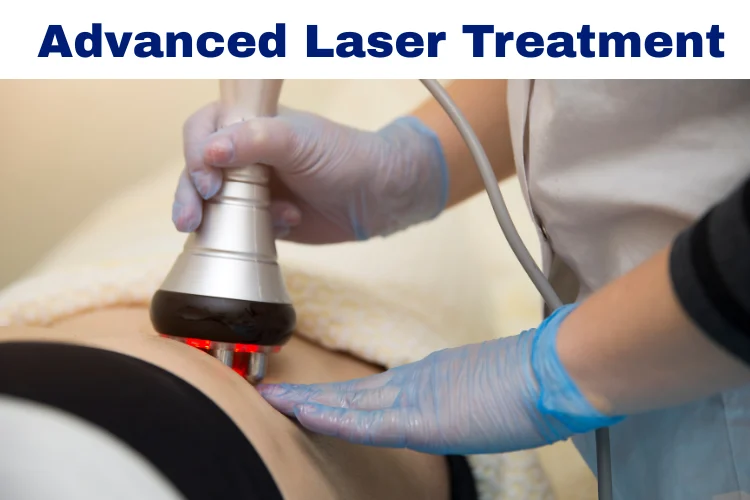Anal tips can interfere with everyday life and cause severe discomfort. Laser surgery has become a contemporary, minimally invasive alternative to other treatments. This article describes the steps involved in laser treatment for anal fissures in India, including recovery time and expenses.
Understand anal fissure
That anal fissure is a small tear in the anus mucosa, which is often the result of passing hard or large stools. Symptoms include pain during bowel movements, bleeding, and itching. If they are not treated, the anal fissures may be older; necessary medical intervention.
Laser treatment for anal fissure process
Laser sphincterotomy is a surgical process that uses laser energy to create an accurate incision in the anal sphincter muscle. The purpose of this technique is to reduce muscle tension, promote treatment, and reduce the risk of complications. The process is usually performed under general anesthesia, and its accuracy and low recovery time are known.
Learn more about laser treatment for anal fissure.
Recovery After Laser Treatment For Anal Fissures
After laser treatment for anal fissures, patients can resume their regular activities in one to two weeks, and it will take about six weeks for them to fully recover. Following medical advice during recovery is crucial, including making dietary changes to avoid constipation and going to follow-up appointments to track healing.
Cost of Laser Treatment for Anal Fissures in India
The city, the hospital, and the surgeon’s level of experience all affect how much laser treatment for anal fissures costs in India. The procedure typically costs between ₹30,000 and ₹91,800. For example, the starting price in Bangalore is ₹55,500.
Factors Affecting the Cost of Treatment
The total cost of laser treatment can vary depending on a number of factors:
Hospital Choice: Private hospitals may be more costly than government-run ones.
Expertise of the Surgeon: More experienced surgeons might bill more.
Additional Costs: Prescription medications, post-operative care, and pre-operative testing may raise the total cost.
Benefits of Laser Treatment Over Traditional Methods
Laser treatment provides many benefits of traditional surgical methods:
- Minimally invasive: tissues reduce damage and related pain.
- Early recovery: Patients often experience rapid treatment time.
- Low risk of complications: Precision reduces the possibility of infection and other problems.
Possible Dangers and Issues
There are possible risks associated with laser treatment, just like with any surgical procedure:
- Infection: Although rare, postoperative infection is a possibility.
- Bleeding: During or after the procedure, some patients may experience bleeding.
- Recurrence: If post-operative care is not followed, there is a chance that the fissure will recur.
Get Ready for Laser Surgery
For a smooth process and recovery:
- Consultation: Your medical history and current medications should be discussed with your surgeon.
- Preoperative Examinations: Your surgical readiness will be assessed by completing the recommended tests.
- To aid with bowel movements following surgery, change your diet to include more fiber.
Post-Surgery Care Tips
- Cleanliness: Keep the anal area clean and dry.
- Pain management: Use painkillers as directed.
- Diet: Continue a fiber-rich diet and stay hydrated.
- Activity: Avoid high activities until your doctor is cleared.
Frequently Asked Questions (FAQs)
1. How long will recovery be from laser treatment for anal fissure?
The majority of patients get back to routine in one to two weeks with a complete recovery within six weeks.
2. Is laser therapy for anal fissures painful?
Since the surgery is done under anesthesia, the patient won’t feel any pain during surgery. Postoperative pain is normally minimal compared to conventional techniques.
3. What is the laser sphincterotomy success rate?
Laser sphincterotomy is also exhibiting impressive success rates, with patients achieving tremendous relief and minimizing recurrence.
4. Will there be some dietary restrictions during and after the procedure?
Having a high-fiber diet along with increased oral intake and sufficient hydration helps to prevent constipation and promote better healing.
5. Are anal fissures likely to return following laser surgery?
Laser treatment does prove effective, and there remains an element of possible recurrence if strict post-operative instruction is not adopted.
6. Is laser treatment covered by insurance in India?
Coverage varies by insurance provider and policy. It’s best to consult with your insurance company to determine eligibility.
Conclusion
Anal fissure laser treatment offers a contemporary, minimally invasive solution with a number of advantages, such as minimal pain and quick recovery. Patients can make better decisions if they are aware of the procedure, associated expenses, and recovery period. To find the best course of treatment for your condition, always seek advice from a qualified healthcare professional.




